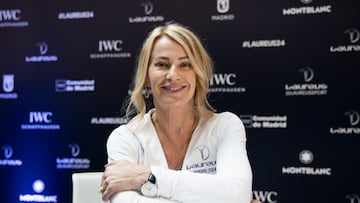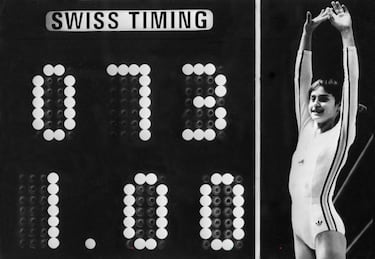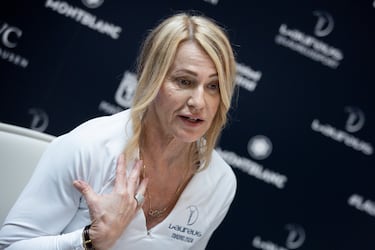Nadia Comaneci: “In my time we didn’t have a word for mental health”
The Romanian gymnastics legend spoke to AS during the run-up to Monday’s Laureus Awards. “In my time we didn’t have a word for mental health.”

On July 18, 1976 at the Montreal Olympics, 14-year-old Romanian gymnast Nadia Comaneci entered sports history through the front door. The teenager’s uneven bars routine scored with the first perfect 10 in history. The scoreboard indicated a result of 1.00 as it was inconceivable that a perfect performance would ever be achieved. In more remarkably, she did after reverting to her Plan B, discarding the initial one after hurting her ankle during practice.
The most famous gymnast of all time is in Madrid to attend the Laureus Awards which take place this evening in the Spanish capital. Nadia took time out to chat to AS and look back on her immense career.
Putting aside your famous perfect 10 for one moment, what is your own personal appraisal of the rest of your career?
The 10 is what put me in the spotlight, because no one knew about me until I did the 10. Probably, if you have read about the story on Wikipedia, because you (the interviewers) didn’t get to see it at the time. You would have seen that the scoreboard could not show the number 10 - the highest it could show was 9.95, so they gave me a 1.00. That was what made people wonder who I was, where I came from, where Romania was and what it was about... And everything was a boom from one day to the next. But that boom was not instantaneous for me, because I had been in the gym since I was six years old (laughs).
Aged just 14, Nadia Comaneci scored the first perfect 10 at Montreal 1976. @nadiacomaneci10 | @gymnastics | #gymnastics pic.twitter.com/ZMDs4m6hkJ
— The Olympic Games (@Olympics) March 11, 2023
A perfect 10, then and now
Today, do you think your routine would have scored 10?
I don’t compare the times, because what we did back then was in its time, and comparing it with now doesn’t really make much sense... No, I prefer not to compare it. It’s history, it’s part of the sport. This generation that practices gymnastics needs to know about all the little stones that have been put in each era so that they have what they have and so that they experience what they have now in gymnastics. You should never forget history and the way in which the sport became popular. This generation will pass it on to the next, and so on.
“The perfect 10 made people wonder who I was, where I came from, about Romania…”
Nadia Comaneci

They say that in sport, and in life, nothing is perfect. Do you think, therefore, that your routine was a flawless 10?
No, I could have done better. But, at that time, what I did was much better than what everyone else was doing, and there were some parts that no one had done before. There was no social media. I didn’t know how good the other teams were, so I was always going for it: ‘Let’s do this and this’. And, when the girl before me competed and got a 9.9, I don’t think there was anywhere else to go because I did so much more and it seemed so easy. So, perfection is like the best of the best at that particular moment, the best of everyone at that particular moment. But once I did that, everyone wanted to be better. So it’s a story without an end. You continue to keep climbing up a rung because you want to be there before the rest.
One routine, two perfect 10s. 💯
— The Olympic Games (@Olympics) November 2, 2023
At Montreal 1976, Nadia Comaneci 🇷🇴 scored full points in both her qualifying round and the finals. 😍 pic.twitter.com/oojeg3rmPh
Mental health, a modern day issue
How important is it for today's gymnasts to talk about issues such as mental health or the sexual abuse they may have suffered?
The beautiful thing about social media is that they allow us to talk about things that we didn’t do before. We didn’t have words for mental health, that wasn’t a word. Everyone suffered, I also had anxiety when I competed. I wanted to do well and I had to prepare myself mentally. i would tell myself, ‘Okay, this is me, just me and the balance beam’. That just existed, and now we’ve learned to deal with it, even though it’s always been there but it didn’t have a name. Let’s say that we knew that the Olympic Games were coming, we had a date, and for example in some training my head was not going where my body was going. With the coaches we wondered what would happen if something like that happened during the Games - or whether we needed to have a plan B. If we could make an easier routine or something to manage better. We all had to talk about it because we had to mentally prepare ourselves for what was coming. And for the media, who came in and said this is the person you’re supposed to look for. That didn’t suit me (laughs).

Busy weekend in Madrid w/ the Laureus Sports Awards! As a judge, I’m thrilled to see the awards here & excited for the nominees. Follow https://t.co/HIvzW52lLr for updates and say hi if you spot our team.
— Benny Bonsu (@MsBennyBonsu) April 20, 2024
Good morning! ☺️☕️ #Laureus24 | @LaureusSport
pic.twitter.com/x4kAzy9uST
Focusing on the positive
Everyone knows about the high point of your career, what was the lowest?
There are a lot of times when you fall, so I try not to look for those bad moments. I am left with what I have learned on the bad days of my career.
You are a big fan of tennis. What do you think of what has happened with your compatriot Simona Halep, who is back after her doping sanction was reduced?
I am very sorry for what has happened to her because it has been a long, long time, and she has wasted a lot of time. I am happy that she won this fight because what happened was contamination. They decided she deserved less time after she had already been out too long, and it’s not easy to come back after so much time in any sport. So I wish her the best and hope to see her playing soon.
Related stories
The 25th Laureus World Sports Awards will take place at the Palacio de Cibeles in Madrid, Spain on Monday 22 April. Shortlists for seven categories (Sportswoman, Sportsman, Team, Breakthrough, Comeback, Action and Sport for Good) are created by votes from more than 1,000 sports media from over 70 countries. The shortlist for World Athlete of the Year with a Disability is provided by the International Paralympic Committee.
Among the nominees in tonight’s ceremony are: Lionel Messi, Novak Djokavic, Erling Haaland, Aitana Bonmatí, Shericka Jackson, Faith Kipyegon, Iga Swiatek, Jude Bellingham, Simone Biles, Linda Caicedo and Coco Gauff.


Complete your personal details to comment